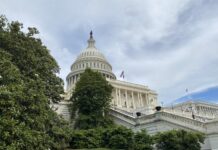
Georgia officials will appeal a judge’s order for lawmakers to draw new political maps with additional majority-Black districts in certain areas but won’t seek to put the ruling on hold in the meantime, paving the way for a special session later this month.
After Wednesday’s filing from lawyers for the state, a three-judge panel overseeing a separate redistricting lawsuit ordered that a trial originally scheduled for later this month be postponed until the appeal is resolved.
Last week, Judge Steve Jones issued a ruling that found a number of Georgia’s state and Congressional districts created in 2021 violated the Voting Rights Act and discriminated against Black voters. The ruling ordered the GOP-controlled General Assembly to create new boundaries by Dec. 8 that include an additional majority-Black Congressional district, two additional majority-Black state Senate districts and five new majority-Black districts in the state House.
Gov. Brian Kemp subsequently announced a special session to address the maps and take up other legislation would begin Nov. 29.
The 516-page decision also said that lawmakers could not fix the issues by “eliminating minority opportunity districts elsewhere in the plans,” but it is unclear if the Republican-led state House and Senate will translate the judge’s order to create additional majority-Black districts into additional seats likely to be won by Democrats, especially the current nine Republican, five Democrat Congressional map.
Jones also noted he would review the maps that would come out of the special session and could draw or approve new political maps if the Legislature “is unable or unwilling to enact remedial plans” by Dec. 8.
Time is a key factor in both this redistricting ruling and other challenges to political districts and voting rules across the U.S., with a prior ruling by the U.S. Supreme Court establishing what’s known as the Purcell principle that generally limits the ability of a court to change voting laws and procedures too close to an election.
It’s almost always election season in Georgia: The election process begins months before the first votes are ever cast, including qualifying, building the ballot with all of the combinations of races with proper candidate names, testing of voting equipment and other steps.
Lawyers for the state said earlier in the case that the new maps would have to be in place by “late January, early February” to give local elections officials enough time to input the changes and prepare for the 2024 election cycle that would be conducted on the new maps.
The decision to not seek a stay of the ruling while the case is appealed means the 2024 election cycle could be conducted on boundaries passed in November 2023; then, a later ruling could change the political lines back to what lawmakers approved in 2021.
This article comes to Now Habersham in partnership with GPB News







